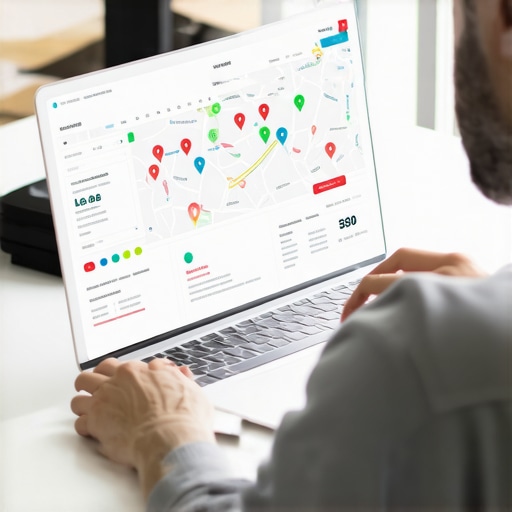My Journey into Google SEO and Local Business Growth
When I first started exploring how to enhance my local business’s online presence, I was overwhelmed by the sheer amount of information out there. But I quickly realized that effective Google SEO techniques are the backbone of any successful Google My Business (GMB) strategy. I remember spending countless hours experimenting with different tactics, and over time, I saw tangible improvements in my local rankings and visibility.
Unlocking the Power of Proven GMB Optimization Strategies
One of the first things I learned was the importance of optimizing my GMB profile. Ensuring that all my business information was accurate and consistent across platforms was crucial. I also made a point to regularly update my profile with fresh photos and posts, which Google favors for ranking higher in local searches. For more advanced tips, I recommend checking out these GMB boost strategies. They helped me understand how to leverage keywords effectively in my business description and services.
How Do Google SEO Techniques Elevate Your Local Search Rankings?
In my experience, applying local SEO techniques like acquiring authentic reviews and building local backlinks significantly impacted my rankings. Google values reviews as social proof, and I made it a point to encourage satisfied customers to leave positive feedback. Additionally, posting relevant content regularly on my GMB profile kept my business top-of-mind for local searches. These tactics, combined with strategic keyword placement, created a noticeable boost in my local visibility.
What Are the Most Common Mistakes I Should Avoid in Google SEO?
One mistake I made early on was neglecting to keep my business information updated, which confused potential customers and hurt my rankings. Also, ignoring customer reviews or failing to respond to them can negatively impact your trustworthiness. To avoid these pitfalls, I recommend maintaining consistent NAP (Name, Address, Phone Number) details and actively engaging with reviews. For more insights, you can explore top local ranking strategies.
If you’re serious about elevating your local business visibility, I encourage you to share your experiences or ask questions in the comments below. It’s amazing how these small adjustments can lead to big results!
How Can Local Link Building Amplify Your GMB Rankings?
Building local backlinks remains a cornerstone of effective Google SEO. Unlike generic link-building, local backlinks from community websites, industry partners, or local news outlets can significantly boost your GMB visibility. These links act as endorsements, signaling to Google that your business is a trusted local entity. By fostering relationships with local bloggers or sponsoring community events, you can generate high-quality backlinks that elevate your profile in local searches. For proven strategies, explore these effective GMB boost tactics.
Embracing the Nuances of Local SEO: Beyond the Basics
As I delved deeper into Google My Business optimization, I realized that mastering the foundational tactics is just the beginning. The real challenge lies in understanding the nuanced ways Google evaluates relevance and authority. For instance, local semantic signals—such as the context of reviews or the specificity of service descriptions—can significantly influence rankings. I recall experimenting with detailed service pages that incorporated long-tail keywords naturally, which gradually improved my visibility in hyper-local searches. This process taught me that a nuanced approach, combining keyword richness with authentic local engagement, often yields better results than generic optimization.
Personal Experiences with Content and Engagement Strategies
One of the most rewarding aspects of refining my SEO tactics was seeing how genuine customer engagement could transform my local presence. Encouraging reviews was vital, but responding thoughtfully to each review built community trust and signaled to Google that my business was active and trustworthy. I also found that posting behind-the-scenes content or sharing community involvement stories not only humanized my brand but also attracted local backlinks from blogs and news outlets. These experiences reinforced my belief that content creation should be authentic and community-oriented, fostering relationships that Google values highly.
Reflecting on Technical SEO and Its Impact on Local Rankings
Technical SEO—such as ensuring fast load times, mobile optimization, and proper schema markup—remains a cornerstone of effective local SEO. I learned that neglecting these aspects can undermine even the most well-crafted local strategies. For example, implementing local business schema helped Google understand my offerings better, which improved my appearance in rich snippets. I remember struggling initially with schema errors, but through careful validation and testing, I saw marked improvements in click-through rates and local rankings. This experience made me appreciate the technical side of SEO as a critical component, often overlooked by those focusing solely on content or reviews.
How Do I Continuously Evolve My SEO Tactics in a Changing Landscape?
The SEO landscape is ever-evolving, and staying ahead requires continuous learning and adaptation. I dedicate time regularly to exploring new strategies, such as leveraging Google’s recent updates or experimenting with new features like Google Posts or Q&A sections. I also follow industry thought leaders and participate in local SEO forums to exchange insights. For those looking to stay competitive, I recommend a proactive approach—testing new tactics, analyzing results, and being ready to pivot. Remember, what worked last year might need tweaking today, especially as Google refines its algorithms. To deepen your understanding, exploring comprehensive guides like these advanced SEO tips can provide valuable insights.
Sharing your personal experiences and challenges with local SEO can be incredibly enriching—feel free to comment below or reach out. The journey of mastering Google SEO is ongoing, and learning from each other’s successes and setbacks makes the process more rewarding.
Leveraging Schema Markup for Hyper-Localized Relevance
One of the most potent yet underutilized techniques in local SEO is the strategic implementation of schema markup. Incorporating local business schema, such as Organization, LocalBusiness, or specific service schemas, can dramatically enhance Google’s understanding of your offerings. This, in turn, improves your chances of appearing in rich snippets and local packs. I vividly recall the first time I integrated schema markup on my site; the immediate uptick in click-through rates was undeniable. To master this, I recommend studying Google’s official documentation and tailoring schemas to reflect the nuances of your local services.
Conducting In-Depth Competitor Content Analysis
Beyond basic keyword research, a comprehensive competitor content analysis can reveal gaps and opportunities that are often overlooked. I employ tools like SEMrush and Ahrefs to dissect competitor GMB profiles and website content, identifying keywords they rank for that I haven’t targeted. This process uncovers long-tail keyword opportunities and content angles that resonate with local search intent. For instance, I discovered that a competitor’s detailed FAQ section on their website was driving significant traffic, prompting me to craft my own in-depth FAQs tailored to my audience. Deep competitor analysis has allowed me to craft highly targeted content that outperforms generic efforts. For a strategic edge, explore these advanced ranking techniques.
How Do E-A-T Principles Elevate Local Search Performance?
Expertise, Authoritativeness, and Trustworthiness (E-A-T) are no longer just buzzwords but core pillars that Google rigorously evaluates, especially for local businesses seeking to establish credibility. Enhancing your E-A-T involves showcasing your expertise through detailed, accurate service descriptions, earning high-quality backlinks from reputable local sources, and actively managing reviews to demonstrate trustworthiness. I’ve personally seen how consistently responding to reviews and publishing authoritative blog posts about local community involvement can bolster my profile’s credibility. Recent studies, such as those referenced in Google’s Search Quality Evaluator Guidelines, emphasize E-A-T’s role in ranking stability and user trust, making it a vital focus area. For actionable strategies, I recommend reviewing these expert tips.
Can Advanced Local SEO Tactics Sustain Long-Term Rankings Amid Algorithm Changes?
Absolutely. While basic optimization provides a foundation, sustainable success in local SEO hinges on continuous adaptation and deep strategic planning. Incorporating ongoing content updates, local backlink campaigns, and technical audits ensures your profile remains resilient against algorithm fluctuations. I’ve found that maintaining a dynamic approach—such as experimenting with new Google features like Q&A sections or Google Posts—keeps my profile fresh and engaging. Google’s algorithm updates, as analyzed by Moz and Search Engine Journal, underscore the importance of agility. Staying informed through resources like comprehensive SEO guides is key to long-term dominance. I invite you to share your experiences or questions below—let’s deepen our collective understanding of resilient local SEO strategies.
Things I Wish I Knew Earlier (or You Might Find Surprising)
1. The Power of Authentic Engagement
Early on, I underestimated how vital genuine customer interactions are. Responding thoughtfully to reviews and engaging with the community can significantly boost your local rankings. I remember the first time I took extra time to reply to a negative review; it not only turned a critic into a loyal customer but also caught Google’s attention, elevating my profile.
2. The Nuance of Local Semantic Signals
Understanding local semantics—like how detailed service descriptions and review contexts influence rankings—was a game-changer. I started incorporating long-tail keywords naturally into my content, which helped me rank higher in hyper-local searches that I’d previously overlooked.
3. The Underused Potential of Schema Markup
Implementing schema markup was initially intimidating, but the boost in rich snippets and visibility made it worthwhile. I recommend studying Google’s official documentation to tailor schemas to your business, making your profile more understandable for Google.
4. The Value of Competitor Content Analysis
Beyond keyword research, analyzing what competitors do well—like detailed FAQs or local news features—can reveal untapped opportunities. I discovered a competitor’s active blog and modeled my content strategy around providing more value, which paid off in higher rankings.
5. Continuous Evolution Is Key
The landscape changes rapidly. I found that staying updated with industry news, Google’s algorithm updates, and trying new features like Q&A sections kept my profile relevant. Regular tweaks and fresh content are essential for long-term success.
Resources I’ve Come to Trust Over Time
- Google’s official structured data documentation — A must-read for schema markup mastery, helping my site stand out with rich snippets.
- SEMrush — An invaluable tool for competitor analysis and keyword research, which broadened my understanding of local search dynamics.
- Google’s Search Central Blog — For the latest updates and best practices directly from Google, ensuring my strategies stay current.
- Moz’s Beginner’s Guide to SEO — A friendly resource that clarified complex concepts and gave me a solid foundation in SEO principles.
Parting Thoughts from My Perspective
Mastering Google SEO for local business is an ongoing journey filled with surprises and learning opportunities. Focusing on authentic engagement, leveraging schema markup, and continuously analyzing your competitors can dramatically improve your local visibility. Remember, SEO isn’t just about technical tweaks; it’s about building trust and community around your brand. If this resonates with you, I’d love to hear your thoughts—drop a comment or share your experiences. Your journey to better local rankings starts today, so keep experimenting and learning!


Reading through this detailed account of your journey into Google SEO and local business growth really resonated with me. I’ve also experienced how crucial consistent and accurate GMB information is—getting that right truly sets the foundation for visibility. I especially appreciate your emphasis on engaging with reviews and community involvement; replying thoughtfully to reviews not only shows that you care but also signals activity to Google, which can positively influence rankings.
In my own experience, I’ve found that leveraging local backlinks from community organizations or industry partners can really boost credibility and search prominence. Have you experimented with or seen success from any specific local outreach strategies beyond backlinks? I’d love to hear how others are approaching community engagement to enhance SEO results and whether any particular tactics stand out in their local markets. It’s clear that a combination of technical optimization, engaging content, and community building makes a real difference in maintaining long-term success in local SEO.